Syria Controversy: Don’t Believe the Official Narrative
Truthdig writers Sonali Kolhatkar and Max Blumenthal disagree with each other regarding key elements in the recent reports that the Syrian government used chemical weapons in Douma. This is Blumenthal's take on the issue.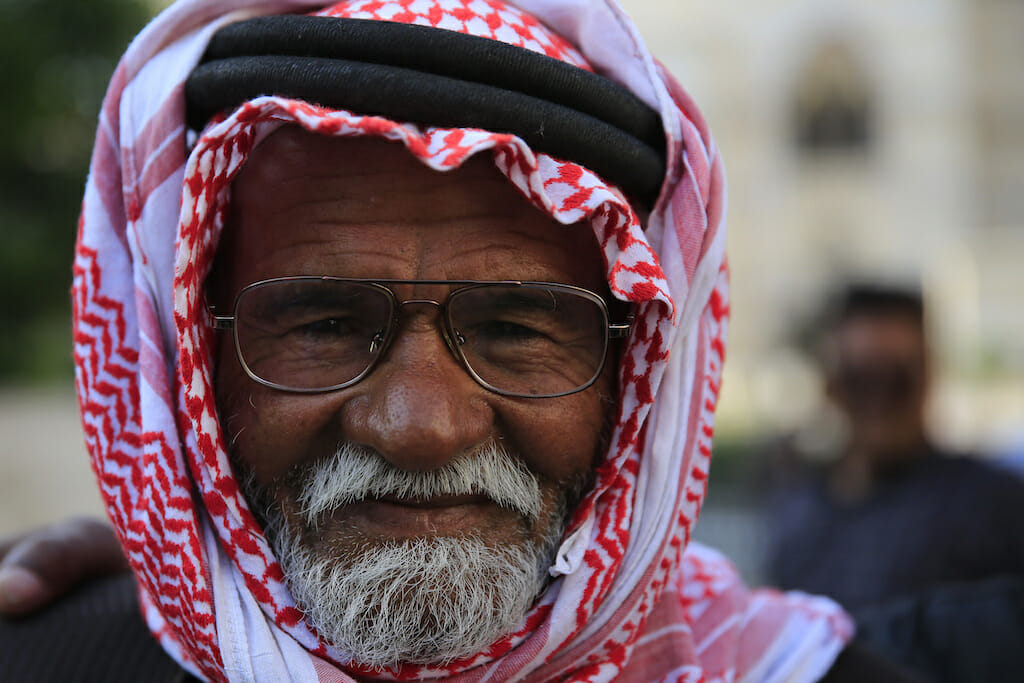 A Syrian poses as he gathers with his family in the Marjeh Square in Damascus on April 15. Syria’s President Bashar Assad spoke that day to a group of visiting Russian politicians, saying that a campaign of "lies" and misinformation in the U.N. Security Council accompanied Western missile strikes against his country. (Hassan Ammar / AP)
A Syrian poses as he gathers with his family in the Marjeh Square in Damascus on April 15. Syria’s President Bashar Assad spoke that day to a group of visiting Russian politicians, saying that a campaign of "lies" and misinformation in the U.N. Security Council accompanied Western missile strikes against his country. (Hassan Ammar / AP)
Editor’s note: Reports of a chemical attack in Syria have generated controversy and conflicting claims about what happened and who was responsible. The April 7 event is still under investigation. On Thursday, Truthdig columnist Sonali Kolhatkar wrote a column titled “Why Are Some on the Left Falling for Fake News on Syria?” Truthdig contributor Max Blumenthal questions her analysis. Below is his response. You can read Kolhatkar’s take here.
This month, the United States, the United Kingdom and France launched airstrikes in Syria in flagrant violation of international law and entirely on the basis of images that had appeared on social media.
To date, no concrete evidence of a chemical weapons attack by the Syrian government in Douma has been produced to support the Trump administration’s justification for the allies’ bombing in response. The only sources of what State Department spokeswoman Heather Nauert described as “our own intelligence” on chemical warfare allegations were the White Helmets and the Syrian American Medical Society.
The U.S. government has funded both groups, and they operate exclusively alongside Salafi-jihadi militants, including the local affiliate of al-Qaida and Islamic State. Both groups also are avowedly dedicated to stimulating support for a Western-led war of regime change against Syrian President Bashar Assad. Neither, therefore, can be considered credible sources of intelligence.
In 2007, journalist James Bamford recalled how Americans had been subjected to “a long line of hyped and fraudulent stories that would eventually propel the U.S. into a war with Iraq—the first war based almost entirely on a covert propaganda campaign targeting the media.” The dirty war on Syria represents an extension of that strategy, with the mainstream media operating hand in glove with insurgent-allied influence operations like the White Helmets to cultivate public support for another war of regime change.
As Adam Johnson demonstrated at the media monitoring outfit FAIR, not one editorial page of any major American newspaper opposed Donald Trump’s strike on Syria. And in the attack’s wake, the Western commentariat criticized Trump not for his illegal bombing campaign but for what was seen as the insufficient violence he displayed.
Having exposed itself once again as an eager channel for an outrageous series of pro-war deceptions, the Western media has forfeited the trust of the public and earned the extreme skepticism, if not the angry wrath, of those it claims to serve. As citizens turn in unprecedented numbers to alternative media sources, their governments have falsely labeled these sources as “Russian bots” and waged a campaign to suppress RT, perhaps the only international English-language network willing to provide a platform to critical voices on the recent events in Syria. When British Adm. Alan West questioned the official narrative on alleged Syrian chemical attacks during a recent BBC interview, his host essentially admonished him against thinking critically in public because “we’re in an information war with Russia on so many fronts.”
Echoing The Intercept and Al-Jazeera pundit Mehdi Hasan, who recently ranted at an elusive mass of left-wing “Assadists,” Kolhatkar even accused anti-imperialist elements of secretly “desir[ing] glorification of leaders and strongmen.” In doing so, she not only assailed the process of intensive truth seeking that citizens should be encouraged to undertake in public debates over war, she gaslighted the truth seekers, casting them as authoritarian lunatics in need of reprogramming.
Kolhatkar took special aim at veteran Middle East correspondent Robert Fisk, who was able to enter Douma and produce testimony by a Syrian doctor that undercut insurgent claims of a chemical attack. To counter Fisk’s on-the-ground reporting, Kolhatkar cited an array of articles from The Guardian, Al-Jazeera, The Associated Press and The New York Times that mostly relied on correspondents outside Syria. Exhibiting a reflexive faith in the credibility of these established outlets, she neglected to examine their record of heinously biased coverage of Syria or the partisan sources they relied on in reporting on Douma.
Citing a Guardian report, Kolhatkar wrongly claimed that the article was written by “journalists on the ground.” The piece was actually datelined from Beirut and Istanbul and contained no on-the-ground reporting. (Kolhatkar’s false reference to “journalists on the ground” was removed with an acknowledgment at the end of the column after I alerted Truthdig editors to the error.) The article’s authors, Kareem Shaheen and Martin Chulov, relied on only one named “Syrian” source: Ghanem Tayara, a doctor based not in Syria but in Birmingham, England. Tayara, who has been agitating within the U.K. for a Western-led military intervention for several years, also was the main source asserting that his colleagues had been coerced into giving testimony that supported the government’s line.
Strangely, Kolhatkar scoffed at the notion that The Guardian could have been part of “some grand conspiracy” to stimulate support for regime change in Syria. She thus ignored the paper’s editorializing for military intervention in Syria, as well as the background of its Middle East correspondent: As I previously reported, Shaheen has promoted material spun out by The Syria Campaign, the PR firm representing the White Helmets, and has favorably quoted the spokesman for Ahrar al-Sham, a Turkish-backed Salafi militia implicated in an array of atrocities. Shaheen was, in fact, the first Western reporter allowed into insurgent-controlled Khan Sheikoun by Ahrar al-Sham after allegations of a chemical attack there in April 2017. Demonstrating his pro-opposition bent, he once tweeted a photo of a neighborhood that had been destroyed by al-Qaida and falsely described it as an exhibit of Assad’s brutality.
Turning to an Al-Jazeera report to undermine Fisk’s coverage from Douma, Kolhatkar openly wondered why any rational person might distrust this Qatari-backed news group’s coverage of Syria. She thus ignored the role of Al-Jazeera’s governmental parent as a top financial sponsor of both the White Helmets and Syria’s al-Qaida affiliate, the Nusra Front. Al-Jazeera has been so dedicated to regime change in Syria that it partnered with Google and Hillary Clinton’s State Department in 2012 to encourage the defection of Syrian army officers to the CIA-backed armed opposition.
The network’s Arabic arm, meanwhile, has featured calls for the genocide of Syrian minority groups by one of its most popular hosts, Faisal Qasim. While promoting the White Helmets, Al-Jazeera’s viral site, AJ+, even appeared to justify the assassination of the Russian ambassador to Turkey by a sympathizer of al-Qaida.
Al-Jazeera also has given its “personality of the week” award to one of al-Qaida’s most prominent media figures in Syria, Bilal Abdul Kareem.
While Al-Jazeera might play a valuable role in providing Westerners with a regular stream of information and opinions on the Middle East, it is about as far from an impartial source on Syria as a network can be. To cast it as an objective source, as Kolhatkar did, would probably qualify under the definition of what she called “fake news.”
Next, in her bid to discredit Fisk, Kolhatkar cited an Associated Press article by Bassem Mroue filed from Douma. However, she strangely omitted the following section, which undermined her case for accusing the Syrian government of carrying out a chemical attack by air:
Nuseir, 25, said he ran from the shelter to a nearby clinic and fainted. After he was revived, he returned to the shelter and found his wife and daughters dead, with foam coming from their mouths.
He and two other residents accused the rebel Army of Islam of carrying out the attack. [Emphasis added.] As they spoke, government troops were not far away but out of earshot. Nuseir said a gas cylinder was found leaking the poison gas, adding that he didn’t think it was dropped from the air because it still looked intact.
The most compelling reasons to doubt that the Syrian government carried out a chemical attack in Douma lay not only in witness testimony but in a basic consideration of motivation and timing. The Syrian army had completely defeated the Jaysh al-Islam insurgents in eastern Ghouta and was on the precipice of destroying them in Douma when the chemical attack was alleged to have happened. From a military standpoint, the Syrian government had no need to deploy chemical weapons, as it had already achieved victory through conventional means. From a political perspective, a chemical attack was suicidal—guaranteed to trip the “red line” imposed by Western governments and immediately trigger military intervention.
The insurgents, however, had every reason to allege that a chemical attack had taken place, as stimulating Western intervention has been their only hope for achieving the objective of regime change.
Kolhatkar attempted to turn this obvious logic on its head, wondering without any apparent sign of irony, “Why would rebels frame Assad only to leave their stronghold right afterward?”
Perhaps the Syrian government was stupid enough to use chemical weapons when it had every motive not to do so. And maybe it was so stupid that it has used them over and over again, flagrantly daring the West to intervene. Someday, Western governments might be able to produce enough evidence to demonstrate that this was the case. But so far, they have been unable to do so. What’s more, they have failed to convince their citizens that another war of regime change against a formerly stable post-colonial Arab state was necessary.
Despite being subjected to a tidal wave of deceptions and a campaign of pro-war perception management of unprecedented scale, the Western public has managed to maintain an attitude of healthy distrust toward its media establishment. The everyday skeptics deserve our congratulations, not condescending lectures and elitist contempt.
Your support is crucial…With an uncertain future and a new administration casting doubt on press freedoms, the danger is clear: The truth is at risk.
Now is the time to give. Your tax-deductible support allows us to dig deeper, delivering fearless investigative reporting and analysis that exposes what’s really happening — without compromise.
Stand with our courageous journalists. Donate today to protect a free press, uphold democracy and unearth untold stories.
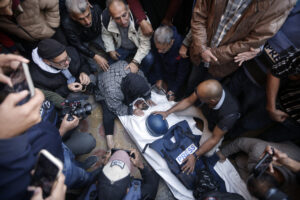
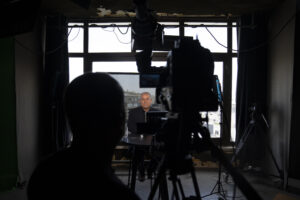
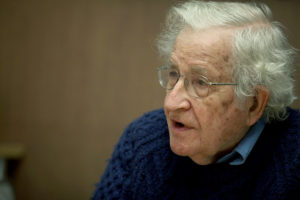
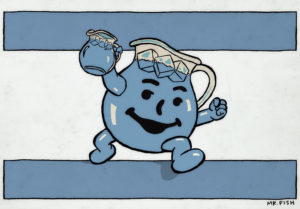

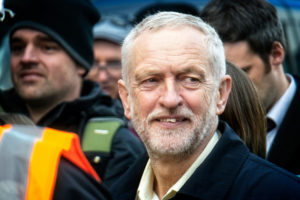


You need to be a supporter to comment.
There are currently no responses to this article.
Be the first to respond.